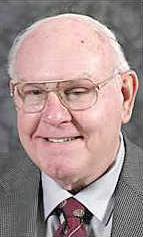The "L"shaped 112th District Kansas House District encompasses the northwest, north central, southwest, south central and southeast portions of Barton County. It takes in the towns of Albert, Galatia, Great Bend, Olmitz and Pawnee Rock; and the townships Albion, Buffalo, Clarence, Comanche, Eureka, Fairview, Grant, Great Bend, Liberty, Pawnee Rock, South Bend, Walnut and Wheatland.
There are 20,728 residents and 8,338 households in the district.
As he sat back and relaxed late Thursday morning, state Rep. Bill Wolf realized it may be the last time in over three months he would have the chance to take it easy.
The Great Bend Republican left for Topeka at noon Thursday to get ready for the start of what promises to be a contentious 2011 legislative session. He will be sworn in at 2 p.m. Monday for his third two-year term representing the 112 House of Representatives District, which encompasses most of Barton County.
"It will be a challenging year," Wolf said.
December reports indicate tax revenues won’t meet expectations and there are projections that the state could face a $500-million budgetary shortfall. In addition to the budget, immigration and abortion could surface.
But, before these and the myriad of issues arise, and before the first gavel falls, Wolf said he will already have a new seat in the House, a new office in the Capitol building and new committee assignments. He will remain on the Transportation Committee, but will now sit on the Child and Family and Social Concerns Appropriations committees.
"We have to live within our means," he said. "We have to do that personally" and government should be held to the same standard. Not only does he believe this personally, the same sentiment resounded in a questionnaire he circulated to constituents.
However, he said, he’s learned government doesn’t work that way. "Government bodies don’t make a profit" like private businesses. "They say ‘if you give us more money we can save you more money.’"
In this bloated bureaucracy, agencies learn to spend what they get at risk of losing future funding. But this is tax money, Wolf said. "They are getting that from us."
With this in mind, he looked to the upcoming session.
Looming large is educational funding and the pending lawsuit filed by Schools for Fair Funding, a coalition of mid-sized school districts seeking equalized funding. "We will fight that down to the last nub," Wolf said, adding lawmakers object to state money being used to sue the state.
Kindergarten through 12th-grade education accounts to about half the total state budget. Add in the Kansas Board of Regents and the six state colleges and education accounts for 65-67 percent of spending.
Even so, he understands the positions schools are in with No Child Left Behind and the challenges they face. And Kansas isn’t alone. "There’s not a state that’s not looking at education."
Now, he said, factor in the 22 percent that goes to social services, and most of the budget is spoken for. "This is where the most pressure comes from. Every body wants a little sliver."
Serving on the Social Concerns Appropriation Committee (will deals with Social and Rehabilitation Services and other similar agencies) will give Wolf his first chance to have input on the budget since that is the task of the appropriations committees.
Being a former businessman gives him some insight into this, but difficult choices may have to be made. "It’s not fun having to let people go, I understand that."
The early drafts of the state spending package exclude any tax hikes, relying instead on the sale of surplus state property. "I’m sure that will be examined before they look at tax increases."
There is, he said, a vocal group of conservative Republicans who want to see the 1-percent statewide sales tax passed last year repealed. But, Gov.-Elect Sam Brownback has indicated he opposes this until the state’s fiscal position is more clear. "We don’t want to cut off our nose to spite our face."
In that regard, there were 49 Democrats in the House last session and only 33 this year. "I hated to see some of them go," Wolf said.
On other fronts, he would be surprised if some sort of an immigration bill didn’t come up this year. But, Brownback has said he won’t push any anti-abortion legislation, unless it is initiated by lawmakers.
But, as Wolf enters his fifth year in the House, still enjoys serving. "I’ve learned more up there than anywhere else," he said. "It’s very interesting."
Among those lessons is that there is not such thing as a perfect bill. If legislation goes through without debate, then it will likely come back later to be revised. "It’s that opposition that makes it better."
The regular session ends in March and reconvenes April 2 for the wrap-up, or veto, session.
Wolf, who is retired from the oilfield sales business, won reelection in November by defeating Democratic challenger Christina Stein. He was first elected in 2007, replacing John Edmonds who opted not to seek another term.





